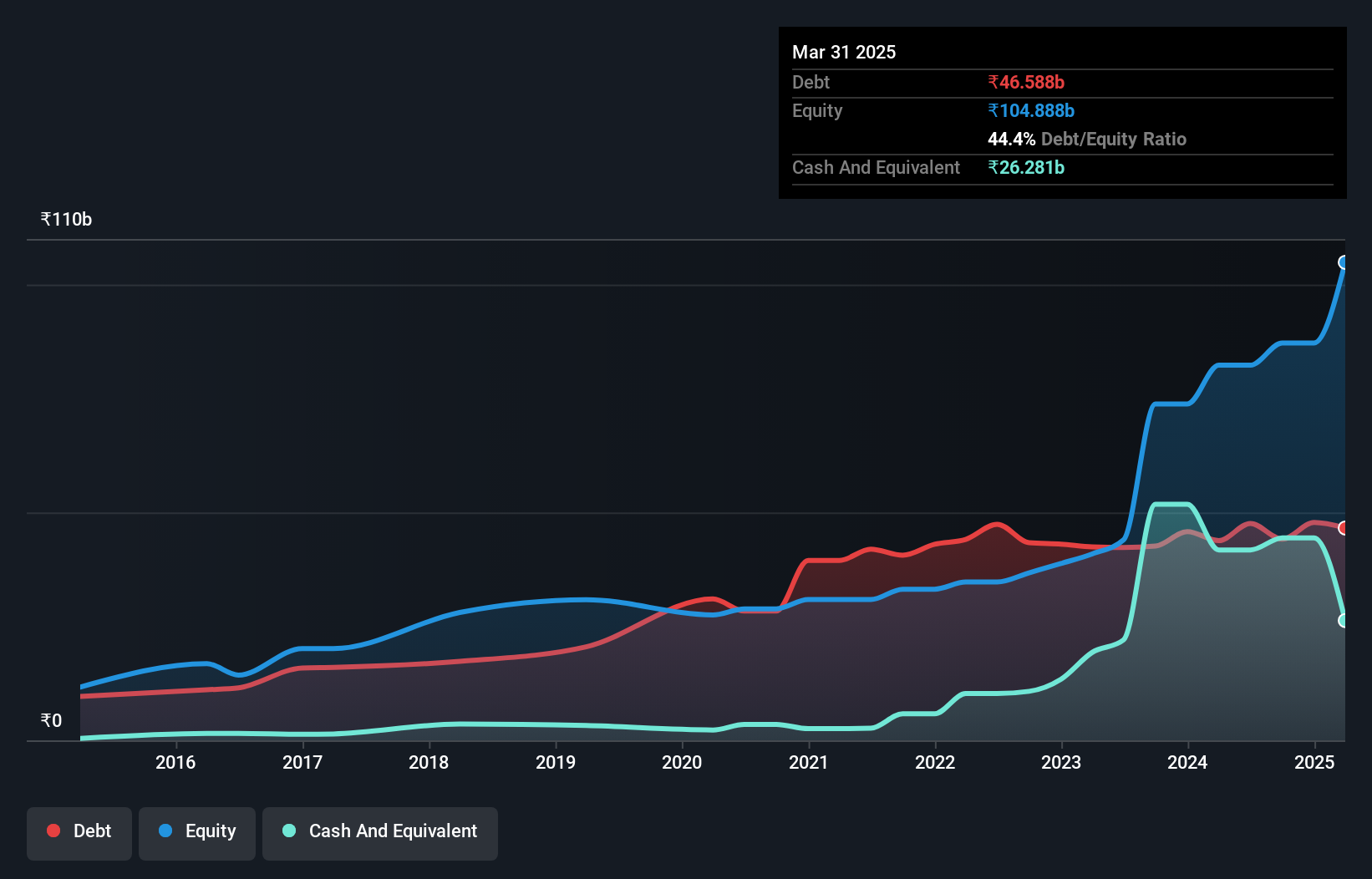- India
- /
- Infrastructure
- /
- NSEI:JSWINFRA
We Think JSW Infrastructure (NSE:JSWINFRA) Can Manage Its Debt With Ease
Howard Marks put it nicely when he said that, rather than worrying about share price volatility, 'The possibility of permanent loss is the risk I worry about... and every practical investor I know worries about.' It's only natural to consider a company's balance sheet when you examine how risky it is, since debt is often involved when a business collapses. As with many other companies JSW Infrastructure Limited (NSE:JSWINFRA) makes use of debt. But is this debt a concern to shareholders?
When Is Debt Dangerous?
Debt and other liabilities become risky for a business when it cannot easily fulfill those obligations, either with free cash flow or by raising capital at an attractive price. Ultimately, if the company can't fulfill its legal obligations to repay debt, shareholders could walk away with nothing. However, a more usual (but still expensive) situation is where a company must dilute shareholders at a cheap share price simply to get debt under control. Of course, plenty of companies use debt to fund growth, without any negative consequences. When we examine debt levels, we first consider both cash and debt levels, together.
How Much Debt Does JSW Infrastructure Carry?
As you can see below, at the end of March 2025, JSW Infrastructure had ₹46.6b of debt, up from ₹43.8b a year ago. Click the image for more detail. On the flip side, it has ₹26.3b in cash leading to net debt of about ₹20.3b.

How Healthy Is JSW Infrastructure's Balance Sheet?
The latest balance sheet data shows that JSW Infrastructure had liabilities of ₹13.7b due within a year, and liabilities of ₹50.7b falling due after that. Offsetting these obligations, it had cash of ₹26.3b as well as receivables valued at ₹12.8b due within 12 months. So it has liabilities totalling ₹25.4b more than its cash and near-term receivables, combined.
Given JSW Infrastructure has a market capitalization of ₹657.7b, it's hard to believe these liabilities pose much threat. However, we do think it is worth keeping an eye on its balance sheet strength, as it may change over time.
See our latest analysis for JSW Infrastructure
We use two main ratios to inform us about debt levels relative to earnings. The first is net debt divided by earnings before interest, tax, depreciation, and amortization (EBITDA), while the second is how many times its earnings before interest and tax (EBIT) covers its interest expense (or its interest cover, for short). Thus we consider debt relative to earnings both with and without depreciation and amortization expenses.
JSW Infrastructure's net debt is only 0.90 times its EBITDA. And its EBIT covers its interest expense a whopping 27.0 times over. So we're pretty relaxed about its super-conservative use of debt. And we also note warmly that JSW Infrastructure grew its EBIT by 12% last year, making its debt load easier to handle. When analysing debt levels, the balance sheet is the obvious place to start. But it is future earnings, more than anything, that will determine JSW Infrastructure's ability to maintain a healthy balance sheet going forward. So if you're focused on the future you can check out this free report showing analyst profit forecasts.
Finally, while the tax-man may adore accounting profits, lenders only accept cold hard cash. So we clearly need to look at whether that EBIT is leading to corresponding free cash flow. During the last three years, JSW Infrastructure produced sturdy free cash flow equating to 68% of its EBIT, about what we'd expect. This free cash flow puts the company in a good position to pay down debt, when appropriate.
Our View
The good news is that JSW Infrastructure's demonstrated ability to cover its interest expense with its EBIT delights us like a fluffy puppy does a toddler. And that's just the beginning of the good news since its conversion of EBIT to free cash flow is also very heartening. We would also note that Infrastructure industry companies like JSW Infrastructure commonly do use debt without problems. Looking at the bigger picture, we think JSW Infrastructure's use of debt seems quite reasonable and we're not concerned about it. After all, sensible leverage can boost returns on equity. Above most other metrics, we think its important to track how fast earnings per share is growing, if at all. If you've also come to that realization, you're in luck, because today you can view this interactive graph of JSW Infrastructure's earnings per share history for free.
Of course, if you're the type of investor who prefers buying stocks without the burden of debt, then don't hesitate to discover our exclusive list of net cash growth stocks, today.
New: Manage All Your Stock Portfolios in One Place
We've created the ultimate portfolio companion for stock investors, and it's free.
• Connect an unlimited number of Portfolios and see your total in one currency
• Be alerted to new Warning Signs or Risks via email or mobile
• Track the Fair Value of your stocks
Have feedback on this article? Concerned about the content? Get in touch with us directly. Alternatively, email editorial-team (at) simplywallst.com.
This article by Simply Wall St is general in nature. We provide commentary based on historical data and analyst forecasts only using an unbiased methodology and our articles are not intended to be financial advice. It does not constitute a recommendation to buy or sell any stock, and does not take account of your objectives, or your financial situation. We aim to bring you long-term focused analysis driven by fundamental data. Note that our analysis may not factor in the latest price-sensitive company announcements or qualitative material. Simply Wall St has no position in any stocks mentioned.
About NSEI:JSWINFRA
JSW Infrastructure
An infrastructure development company, operates commercial ports in India and internationally.
Excellent balance sheet with proven track record.
Market Insights
Community Narratives



